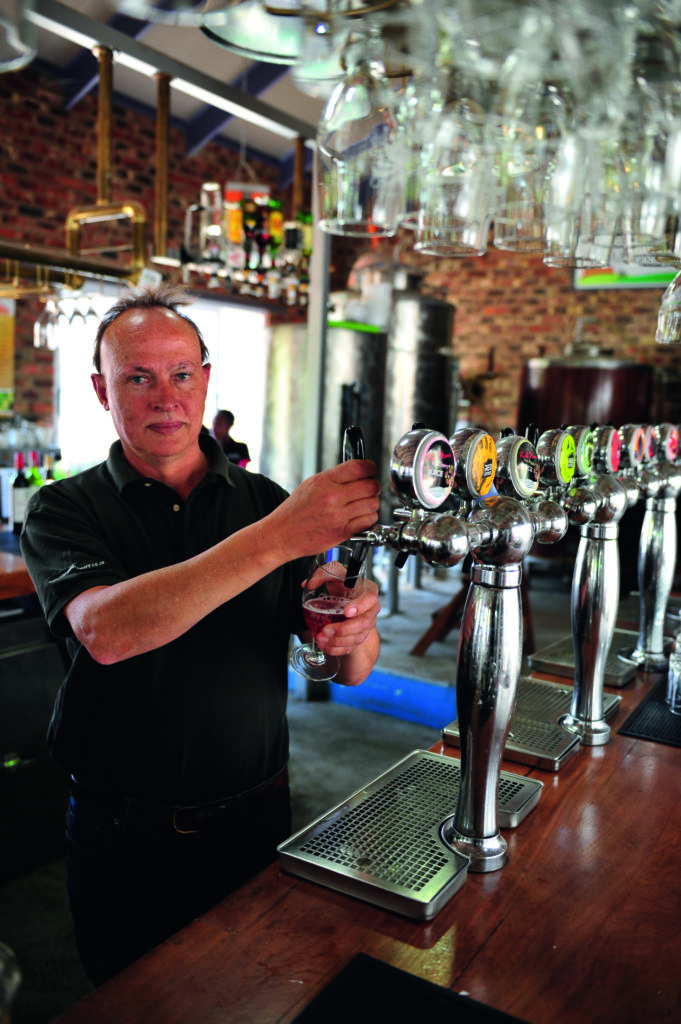Stephan Meyer and his wife, Natalie, sold their computer business to move to Clarens, a quaint tourist town nestled in the foothills of the Rooiberge, in the Free State, South Africa.
In 1999, they bought an apple and cherry orchard of 13,000 trees for the export market. Then Meyer did something unexpected, he became a brewmaster. Since the taps began flowing in December 2006, the Clarens Brewery remains the only microbrewery, or brewpub as he calls it, in the province. Meyer began brewing 450 liters a month; today, he brews 8,000, has a selection of three ciders and six beers and thousands of thirsty customers.

“It’s a very nice career change,” says Meyer.
But why did they do it?
“We always wanted to come back because I’m from this area. We always spoke about vaporware, where nothing is tangible […] It’s something that doesn’t exist, it’s like an empty hole. We always dealt with computer software, it’s something that you can’t see. Now, everything that we do—we’ve got the farm and we make the beer—you can touch and feel and see,” he says.
At first, Meyer battled to perfect the cider because he used culinary instead of cider apples. So, he joined Worthogs Brew Club and two years later began selling apple, cherry and pineapple cider. Soon after, he became a certified beer judge and began to brew.
“Seven years ago, we got a small 50-liter brewery in town. Currently, we are brewing on an 800-liter system.”
Meyer outgrew the brewery and relocated to a bigger premise on the corner of Clarens town square. In early 2012, he moved to a prime position on Main Street. While his rent doubled, his turnover quadrupled and so Meyer encourages business owners to invest in the location of their business.
“These premises actually pushed our sales up from 2,000 to 8,000 liters a month. We just moved 200 meters, now we’re a lot more visible,” says Meyer.
Today, Clarens Brewery serves 2,500 customers each month, many of whom are attracted by the free tasting. It helps one settle on a favorite—whether it’s the flagship Blonde, with a biscuity aftertaste; the award-winning Red, the amber ale with a fruity aroma; or the Stout with its coffee aftertaste. All this, while watching the brewmaster at work.
Meyer is active in the beer community, he attends craft beer festivals and enters his hand-crafted brews into competitions.
“The last time we won something was at the SA on Tap Festival in Randburg, Johannesburg in March 2012. Our IPA [Indian Pale Ale, 7% alc.] came first. It’s very bitter but it’s quite a balanced beer.”
Business is flowing—now is the time to open a brewery. A small brewery with second-hand or reconditioned stainless steel vessels and equipment can be established for around R300,000 ($27,600), he says.
But just like barley and hops, opportunity needs to be harvested.
“There is a lot of growth in the industry. We were very lucky with the industry that we’re in, but for now anybody that gets into this micro-brewery industry, it’s the right time to do so […] Your profit margins on these types of businesses are very high. You should be able to produce a beer for about 30% of the cost that you sell it for,” he says.
And one needs a sober business plan. Meyer sells directly to his end customer, 50 meters away from where the beer is brewed.

“Sixty five percent of our sales are bottles that are bought here. The guys come in over the weekend and have two or three beers. When they leave, they take a box. Nobody can take our business away because they can’t take our customers away. And there is no middleman, so we take most of the margin.”
While 95% of his customers are tourists, locals keep the demand high. As artisinal products are becoming popular, he has witnessed a move away from mainstream lagers.
But it’s not easy running a business in a remote town. The brewery uses reserve tanks when there is no water and dumps beer if there is a power outage.
“All the raw materials, our malt, hops, everything, we have to transport here and the transport cost is quite high. All the specialty malts are imported from Germany, we collect them in Johannesburg,” says Meyer.
Regardless of the challenges, his kegs empty—a sign that beer remains the world’s most popular alcoholic beverage. FL
